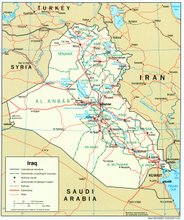Based on the book, Blockade & Desctruction of Iraq by Mohammed Alomari, 2002, with few updates
January 9, 2015
=============================================
-
The statistical information used in this book of the makeup of the Iraqi population is based primarily on official U.S. government reports, including ones from the U.S. Central Intelligence Agency (CIA), which periodically produces country profiles and fact books, and the UN Oil-for-Food program.
According to these reports, Iraq’s population is estimated at just over 32.6 million (2014), and is made up of various ethnic and religious groups. The overwhelming ethnic group is the Arabic majority whom comprise approximately 80% of the population. The largest single ethnic minority is the Kurdish minority, who are mainly in the northern regions bordering Turkey and Iran.
Other smaller ethnic minorities include the Turkomans (who speak an older form of Turkish), Assyrians and Chaldeans (who speak Syriac), and Armenians.
The overwhelming majority of Iraqis are Muslims, comprising about 97% of the population, and consisting of both Sunnis and Shiites. The single largest religious minority is the Christian community, consisting of Catholics, Protestants, and Orthodox Christians. The other much smaller religious minorities include the Mandean Sabians, Yazidis, and Jews.*
Due to Iraq's unique makeup of different denominations and ethnic groups, it is noteworthy to mention some percentages of the ethnic/religious makeup.
The 2003 Census by the Iraqi Ministry of Trade, as approved by the UN, offers a break-down of the sectarian make-up of Iraq.
In Iraq, as previously mentioned, 97% of Iraqis are Muslims, both Shiites and Sunnis. The Shiites in Iraq are primarily Arabs, although some are of Iranian origin, and some very small numbers are Kurdish Faylis and some Turkoman Shabak. The Sunnis in Iraq are primarily Arabs, although many are Kurds and Turkomans.
Many people when mentioning the Sunni-Shiite percentage in Iraq make the mistake of comparing only the Shiite Arabs to the Sunni Arabs, where in fact the Kurds and Turkomans compromise a sizeable portion of the Sunni population. Shiite Arabs are more than Sunni Arabs, but not all Sunnis. Sunnis althogether, which include Arabs, Kurds and Turkomans, althogether compromise almost 60 % of the Iraqi people.
We know for instance the south is not all Shiite as some mistakenly believe. In fact, half of Basra is Sunni, southern towns like Zubair and Fao are predominately Sunni, and so on. That is in addition to major cities like Baghdad which is majority Sunni, and Mosul, etc. To put these percentages in their proper perspective, here are some figures:
Total Sunnis ----------- 58%
Total Shiites ----------- 40%
Arab Shiites ----------- 39%
Arab Sunnis ----------- 36%
Kurdish Sunnis ------- 16%
Turkoman Sunnis ----- 5%
Christians --------------- 1.5%
Other Shiites ---------
(Feylis, Shabak, etc) --- 1%
Sabians, Yazidis, oth --- 0.5%
Finally, one note that needs to be made is that in spite of this unique makeup, inter-marriage between these groups is very wide-spread. In fact major tribes like Al-Jabbour, Al-Shammar, Al-Taaee, and Al-Tameemi are divided into both Sunni and Shiite parts. In addition, there is much inter-marriage between Arabs, Kurds, and Turkomans.
The hope of most Iraqis is that they can overcome the ethnic and religious differences and forge a unified state that puts an emphasis on capabilities over denomination. A true democracy will secure the rights of all and promote the principle of plurality.
Subscribe to:
Post Comments (Atom)

No comments:
Post a Comment